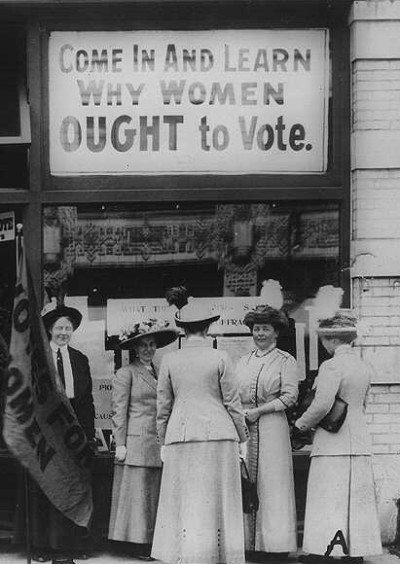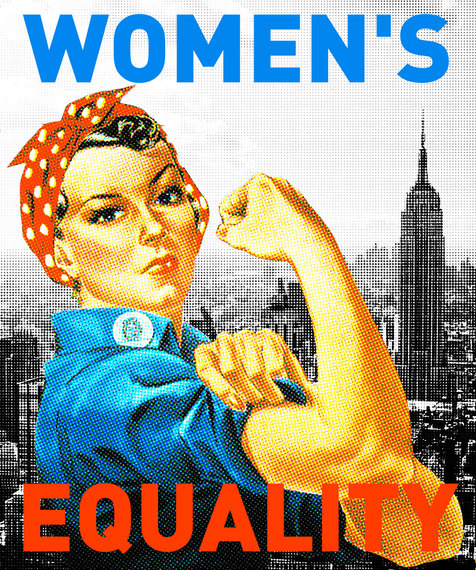
On a day like today in 1920, the 19th Amendment to the Constitution was enacted and American women gained the right to vote. This was the culmination of a civil rights movement that had its formal beginnings in 1848 at the world's first women's rights convention in Seneca Falls, New York.
After 72 years of campaigning, women had achieved suffrage in the United States. To celebrate, today is Women's Equality Day, a commemoration that was put forth in 1971 by Rep. Bella Abzug, former congresswoman and champion of women's rights.
Now that you're caught up with the basics, let's get back to 2016. Certainly those 72 years of campaigning served as practice for this year's historic elections given that, for the first time, a woman is the presidential candidate of a major party of this country.
Well, guess our work here is done. Glass ceiling shattered! Look ma, we made it!
One can dream. Although women surpass men in the proportion and number of voters across the nation, big numbers at the ballot box hasn't yet manifested in equal representation in government. According to the most recent study by StatusofWomenData.org, as of March 2015, women held just 104 of 535 (19.4 percent) of seats in U.S. Congress, 1,786 of 7,383 (24.2 percent) of seats in the nation's state legislatures, and 78 of 317 (24.6 percent) statewide elective executive offices.
And the pay gap, oh, the pay gap. The pay gap is real. In 2013, the median annual earnings for millennial women working full-time, year-round were $30,000, compared with $35,000 for their male counterparts, resulting in an earnings ratio of 85.7 percent. (StatusofWomenData.org)
And that's just the beginning. From violence to institutionalized sexism, the battle for paid family leave to the fight for reproductive rights, women are perennially disenfranchised.
And I don't know about you, but -perhaps due to its bizarre nature- this election has lacked nuance and made it difficult to find intersectionality among the issues. Either I'm a millennial, or a woman, or a Latina, which means I singularly care about college debt, the wage gap, or immigration. Our ability to vote as full human beings has been been grossly discounted and our views have been missing from the airwaves.
To get some perspective, I caught up with two awesome millennial Latinas, Cristina Lopez, staff at Media Matters for America and Melissa Macaya, producer at CNN en Español, who are killing it in the media. Here's a glimpse of what they've gleaned from this election cycle:
Q: What is the biggest obstacle to women's equality in the U.S.?
Cristina: Because the obstacles to equality are structural and ingrained in otherwise innocuous ordinary daily situations, it's hard to point exclusively to one. I think violence against women, ranging from street or workplace harassment to the lethal violence that plagues many transgender women, is perhaps the most perceivable obstacle, and one that media could help in tackling.
Melissa: Work and family balance. I grew up surrounded by strong professional women that always told me I could do and be whoever I wanted to be. As I have entered the professional world and met successful career women, I've realized that having both a career and a family is difficult. Professional environments have become more accommodating, providing child care and allowing some of their employees to work from home, but more needs to be done.
[To echo Melissa's qualms, an Ernst & Young study finds that millennial women in particular are so serious about finding work-life balance, they're willing to relocate to find it.]
Q: What issues that you care about have been overlooked in this election?
Melissa: This has been a fascinating election to cover. As a Latina journalist who produces coverage about Latin America for a Spanish-speaking audience, I feel that the region has largely been ignored during both national and local election events. The candidates have not voiced the concerns of our CNN en Español audience, which is found in both Latin America and the United States, who want to know how each candidate plans to interact with the region if elected president. The concerns of Hispanic young people have also barely been discussed. When discussing the Hispanic population, the candidates primarily have remained focused on immigration. For young Hispanics, topics such as college affordability and the economy are of huge importance.
Cristina: This might sound like an idealist's letter to Santa, but since we're on the topic of equality and since I scrutinize political coverage of the media daily, I definitely believe media could do more to discuss issues of police brutality and the abuse of power against minorities. Other items down the laundry list include surveillance/privacy issues, climate change, and money in politics. In any case, it's worth demanding that media, Spanish and English-language, put these discussions on the table and introduce them in political debates.
Q: How does being Latina (Hispanic, Latin-American, etc.) influence your choices at the ballot box? Or does it?
Cristina: In my role observing the media -- including election coverage -- it's been interesting to notice how more than ever in my time living in the U.S., Hispanic, Latinx or Latin American identities, have become such an important element in political media coverage, either because of the effervescent electoral empowerment of the Hispanic community or because of the terrifying inflammatory rhetoric found in some corners of the campaign trail. As a non-citizen, I can't go to the ballot box, which is something I use to encourage friends around me to not take their right to vote for granted, as with their vote they're representing a larger demographic than they might be aware!
Melissa: As an individual who was born and raised in Venezuela and is also an American, my cultural identity impacts the way I view the importance of the election. I value democracy and the right to vote because in my home country democratic institutions have continually weakened. When covering the election and also making an individual choice, the policies of each candidate regarding Latin America and Hispanics are of great importance to me because I am very much connected to both the region and the community.
Melissa and Cristina represent a sliver of the spectrum of interests that concern our demographic. And as we elevate millennial's varied voices we'll increasingly remind those in power that we're the most diverse generation in this country's history.
As I reflect on Women's Equality Day and look back at what the trailblazers before us have accomplished, I am filled with gratitude to be living in a time and in a place where the odds of achieving equality for women are ever in our favor.
Today we celebrate, but tomorrow, the fight continues.


